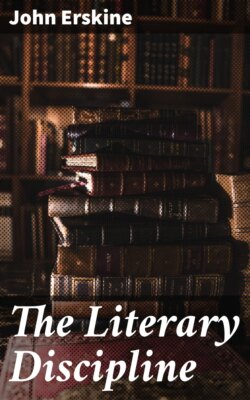Читать книгу The Literary Discipline - John Erskine - Страница 6
На сайте Литреса книга снята с продажи.
I
ОглавлениеTable of Contents
The quarrel with indecent art is an old one, and the present discussion of improper books, with threats of censorship, begins to rally itself in two familiar camps—on one side the moralists, showing in the heat of debate less understanding of art than they probably have, and on the other side the writers, showing in the same heat somewhat less concern for morals than it is to be hoped they feel. The censorious seem disposed to suppress on the ground of indecency almost any kind of book they happen not to like; the writers seem at times to argue that all books are equally good, or, at least, should be free and equal. These are the old exaggerations of the quarrel. Yet in two important respects the present discussion is quite novel and more than usually interesting; for one thing, the attack now is less on obscenity, about which there are no two opinions, than on indecency, of which we have at the moment no adequate definition; for another thing, the writers themselves, perhaps for the first time in history, have no definition of literary decency to offer, and seem not greatly interested in forming one.
Censorships are usually exercised for the protection of religious or political doctrine, and whatever may be said against the method, at least in the field of religion or politics the censor knows clearly what he wishes to protect. But if we now would protect decency, we must first define the term. It is not enough to have a moral conviction on the subject; we must have also some principle outside of our emotional prejudices, based on something more lasting than fashion. In the present welter of contradictions and opprobrium it is sometimes thought indecent to wear bobbed hair or short skirts; for the morals of the school, teachers have been dismissed who rolled their stockings below the knee. Obviously, these are not great faults in decency, if faults at all; a good deal of camel must have been swallowed before justice could be done to these gnats. Some of our neighbors wish to suppress certain plays; others wish to suppress the theatre. Some wish to suppress Swinburne and Baudelaire, with one hand as it were, while distributing with the other copies of the Bible containing the Song of Songs. A minister of this type, earnest in his work for decency and quite muddled as to what it is, told me that he could not give his approval to the Spoon River Anthology, brilliant though it was; he could approve of no book that portrayed fornication. Yet he must have read the story of Lot’s daughters and their behavior with their father. He approved of the Bible, and he would probably not call it indecent. What is decency, then, or its opposite?
At this point the writers ought to stand up and answer. In other ages they would have done so; they would have thought no one so competent as the artist to define decency in his own field, and they would have stated their definition from the point of view of art. They would have called it “decorum” instead of “decency”, but they would have meant the same thing—fitness or propriety in the particular art they practised. When Milton made his famous plea on ethical grounds for freedom of the press, he went on, as an artist, to say that of course there are good and bad books, and when a book has had its chance, it must submit to the judgment of the competent. He was writing in an age when the reader might be expected to have some training in artistic definitions of decorum. If books are to enjoy freedom of publication now, it seems incumbent upon the writers to define the decency of their art, and to spread the knowledge of the definition, as widely as possible, that the competent reader of today may have a standard by which to judge.
